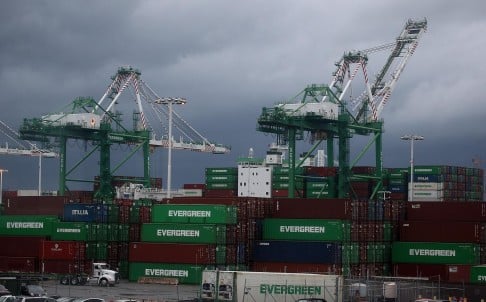US port dispute sees some goods shift to air from sea
PUBLISHED : Monday, 09 February, 2015, 6:00am
UPDATED : Monday, 09 February, 2015, 6:00am
Japanese carmakers including Honda Motor and Subaru are already sending some parts to the US by air to bypass the slowdown. Photo: AFP
Manufacturers and retailers in the United States are stockpiling goods and taking steps to bypass West Coast ports amid a labour dispute that the operators of the facilities say threatens a shutdown disrupting more than 40 per cent of US trade.
Stalled talks with the International Longshore and Warehouse Union had pushed the 29 ports to the brink of a "coast-wide meltdown", said James McKenna, the president of the Pacific Maritime Association, the trade group of shippers and terminal operators.
The union's president Robert McEllrath said the management was responsible for the congestion crisis and the parties were close to a settlement.
Users of the biggest US container ports have faced slowdowns and backups since the middle of last year, with congestion worsening in November as unionised dockworkers reduced productivity at several locations, according to the maritime association.
With prospects growing of a coast-wide shutdown, some shippers say they are shifting to backup plans.
"A lot of the suppliers will stop putting any sort of inventory on a ship now," said Neel Jones-Shah, the president of JS Aviation Consulting and chief commercial officer for Los Angeles-based forwarder Able Freight. "They know it's going to get stuck at sea for weeks before it gets unloaded."
Japanese carmakers including Honda Motor and Subaru are already sending some parts to the US by air to bypass the slowdown.
Airlifts began late last month on concern that the stalled labour negotiations could slow deliveries enough to hurt production, the companies said.
Air shipments were 15 to 20 times more expensive than by sea, said Satish Jindel, the founder of SJ Consulting Group, a Pennsylvania-based shipping consultant.
"Everything that is going by ocean isn't going to convert to air," Jindel said. "But if they were sending four containers by ocean and they know they're going to get delayed by two weeks, they may send half a container by air to have something in the stores while the other 31/2 containers come by ocean."
Jonathan Gold, the National Retail Federation's vice-president of supply chain and customs policy, said companies had been stockpiling seasonal merchandise in warehouses, moving some goods through air and shifting to East and Gulf coast ports.
Manufacturers might be increasing inventory to brace for a disruption at the ports, which would crimp the efficiency of just-in-time supply chains, said Bruce Carlton, the president of the National Industrial Transportation League, a shipper trade group.
The West Coast ports handled 43.5 per cent of containerised cargo in the US in 2013, according to the maritime association's annual report, accounting for about 12.5 per cent of US gross domestic product.
The maritime association locked out workers for 10 days in 2002 during contract talks. That cost the US economy US$1 billion a day, the association said.
A 20-day lockout now would cost more than US$2 billion a day, it said in a report last year.
More than 20 ships queued last week at the harbour shared by the Los Angeles and Long Beach ports, up from as few as four in mid-December, according to the Marine Exchange of Southern California
.
.

No comments:
Post a Comment